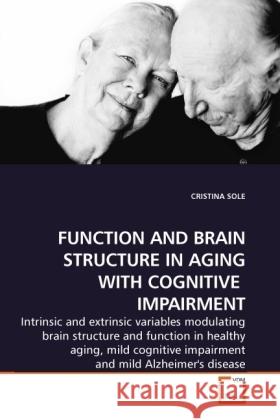FUNCTION AND BRAIN STRUCTURE IN AGING WITH COGNITIVE IMPAIRMENT : Intrinsic and extrinsic variables modulating brain structure and function in healthy aging, mild cognitive impairment and mild Alzheim » książka
FUNCTION AND BRAIN STRUCTURE IN AGING WITH COGNITIVE IMPAIRMENT : Intrinsic and extrinsic variables modulating brain structure and function in healthy aging, mild cognitive impairment and mild Alzheim
ISBN-13: 9783639134209 / Angielski / Miękka / 2010 / 168 str.
FUNCTION AND BRAIN STRUCTURE IN AGING WITH COGNITIVE IMPAIRMENT : Intrinsic and extrinsic variables modulating brain structure and function in healthy aging, mild cognitive impairment and mild Alzheim
ISBN-13: 9783639134209 / Angielski / Miękka / 2010 / 168 str.
(netto: 290,36 VAT: 5%)
Najniższa cena z 30 dni: 304,88
ok. 10-14 dni roboczych
Bez gwarancji dostawy przed świętami
Darmowa dostawa!
There is some specificity to what cognitive functions decline during aging. Episodic memory has been extensively studied concluding that aging could affect encoding strategies to assure a proper learning. Patterns of brain function also change with aging, compromising the frontal lobe with a loss of the asymmetric activity observed in young adults. The present work is focused on the study of how certain variables can modulate brain activity and connectivity patterns in healthy elders, patients with mild cognitive impairment and mild Alzheimer s disease. Some of the factors explored herein are certain genetic polymorphisms, cognitive reserve proxies as well as the use of techniques able to transiently modify cortical excitability such as transcranial magnetic stimulation. This work might be seen as an attempt to show that an integrative approach using both environmental and genetic factors that significantly modulate brain structure and function in elders with and without cognitive impairment is suitable to investigate brain- behaviour relationships in this population.











